06 Sep 2018
•
1 min read
Yogurt can enhance satiety

Related posts
Table of contents


A balanced diet, exercise and maintaining a healthy weight are widely recommended to help prevent type 2 diabetes and keep our blood vessels and heart in tip-top condition. So it’s more than likely that eating lots of fruit and vegetables is high on your ‘to-do’ list for keeping fit and healthy – but growing evidence suggests that dairy products such as milk and yogurt could play an important role too. Evidence from this study suggests eating just one more pot of yogurt a day may make all the difference.
Scientists have identified several risk factors that help determine why some people are vulnerable to type 2 diabetes, heart disease and stroke while others sail through life without them. Excess fat around the midriff, low ‘good’ (high density lipoprotein, HDL) cholesterol, high triglycerides, raised blood pressure, and resistance to insulin together form the metabolic syndrome – which spells bad news for our heart and circulatory system.
It’s common knowledge that diet is important in combating these risk factor components of the metabolic syndrome. While the benefits of eating more fruit and vegetables, cutting down on red meat and saturated fat, and avoiding sugar are well established, the effects of dairy products on these risk factors have until now been less clear.
The authors of this article therefore reviewed studies looking at the relationship between intake of dairy foods and the development of the risk factors in healthy people.
An analysis of the combined data from all the studies showed that an extra daily serving of dairy foods was associated with a 9% reduction in the risk factor components of the metabolic syndrome. The reduction in risk factors was seen with specific types of dairy food consumption as well as total dairy food consumption.
An extra glass of milk a day was associated with a 13% reduction in risk factors, while an extra pot of yogurt a day was associated with an 18% reduction.
More specifically, a one-serving per day increase in the amount of yogurt consumed was associated with a 16% lower risk of raised sugar levels in the blood.
‘These results suggest that specific types of dairy food consumption such as milk and yogurt as well as total dairy product intake were inversely linked to the [metabolic syndrome] and its components.’ – Lee M et al, 2018.
When the authors looked at the fat content of dairy foods, an extra daily serving of whole-fat dairy food was associated with a 22% reduction in risk factors. In contrast, low-fat dairy foods showed no association.
It’s likely that the nutrient-rich content of dairy products such as milk and yogurt may contribute to reducing risk factors for heart and vascular disease and diabetes.
For example, calcium in dairy products can reduce fat absorption from the gut, it may reduce the production and storage of fats within the body, and it might have beneficial effects on blood lipids. Milk proteins, such as casein and whey protein, have been shown to regulate several risk factors, and may be particularly important in lowering blood pressure.
The association between yogurt consumption and reduced risk of hyperglycaemia seems to be partly due to vitamin K2 which is synthesised by bacteria in live yogurt and has been linked to a reduced risk of type 2 diabetes.
A possible explanation for the lack of an association between low-fat dairy foods and risk factors is that people eating low-fat dairy products may eat more fat or carbohydrate from other sources which may cancel out any benefits.
This study only included data from observational studies in which there was no attempt to change people’s diet in any way. To strengthen the evidence, the authors recommend that a similar analysis should be carried out on data from studies in which people have been randomly allocated to eat different types and amounts of dairy foods.
Find out more: read the original article.
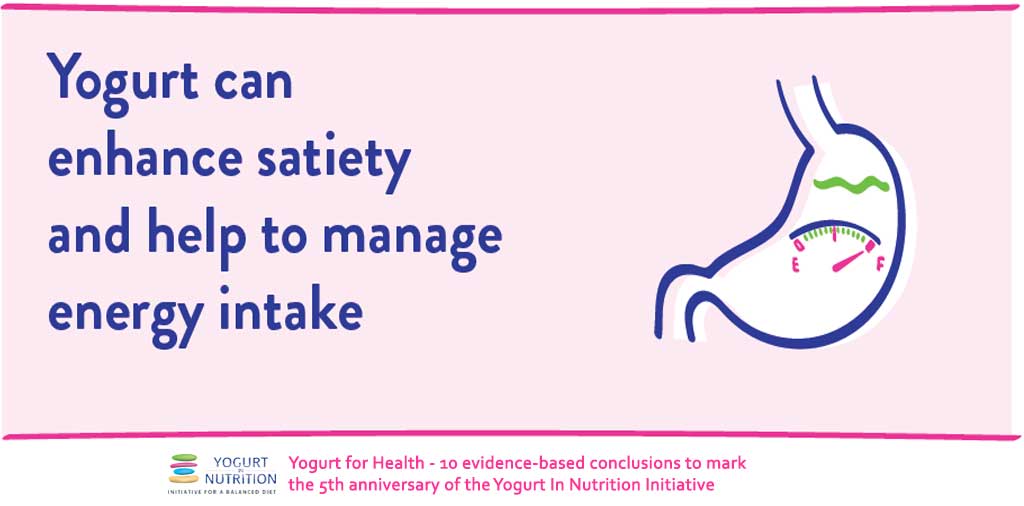
“Yogurt can enhance satiety and help to manage energy intake” is one of the 10 evidence-based conclusions made by the YINI board about the health effects of yogurt. Learn more below…
Several factors may account for the satiating properties of yogurt, including nutrient content and effects on appetite-regulating hormones.
“Yogurt promotes satiety probably because of the satiating properties of dairy proteins. Its high calcium content might also facilitate appetite control in low-calcium consumers.” – Dr Angelo Tremblay
References:

You may not feel it but the chances are your body develops signs of inflammation whenever you eat a large meal. The inflammation can be particularly pronounced if you’re obese – and this is a problem because it’s linked to an increased risk of serious conditions such as heart disease and diabetes.
The solution? Well, simply eating a bowl of yogurt as an appetiser may help, say the authors of this article. They carried out a trial suggesting that a serving of yogurt before a meal may safeguard against the metabolic upset that can occur after a meal and so reduce the risk of inflammation and long-term health threats.
When we eat a meal we all tend to get low-grade inflammation resulting from the spikes in sugars and fats that occur in our bloodstream as we absorb the digested foods. This sudden surge can cause damaging oxidative stress, which in turn leads to inflammation. And to make things worse, obese people tend to have a weakened intestinal barrier which means that toxins from bacteria can escape the gut and be carried around the body by piggy-backing on dietary lipids. These bacterial toxins – endotoxins – can further trigger inflammation.
Dairy proteins and calcium can quash the surge in sugars and fats seen after a meal. Yogurt consumption may also help to preserve the intestinal barrier. In elderly people, eating low-fat yogurt has been shown to reduce the endotoxins and inflammatory markers in the blood. Yogurt has also been associated with a reduced risk of type 2 diabetes.
The authors of this article investigated whether benefits could be gained in tackling inflammation by eating yogurt just before a meal, and whether this could come to the rescue of people with obesity.
Their study involved 120 obese and non-obese premenopausal women. The women were randomly allocated to eat either low-fat yogurt (339 g) daily for nine weeks, or a non-dairy control food of soy pudding (324 g).
To determine both the short- and long-term effects of eating yogurt before a meal, the participants were asked to eat a ‘challenge’ meal at the beginning and end of the study. Immediately before the challenge meal, they all ate either a portion of yogurt (226 g) or soy pudding (216 g). Blood samples were then taken every hour for four hours after the meal to measure chemical markers of inflammation and metabolism.
Results showed that eating yogurt before a meal improved post-meal metabolism and markers of bacterial toxins in both obese and non-obese premenopausal women.
Compared with the control food, a pre-meal helping of yogurt inhibited a post-meal surge in blood sugar levels as well as reducing levels of certain markers of inflammation and bacterial toxins.
Eating yogurt daily for nine weeks further improved some of the makers, suggesting that daily consumption of yogurt may have a moderate long-term benefit in reducing the effect of endotoxins. However, further reductions in post-meal inflammation may require longer than nine weeks of regular yogurt consumption, suggest the authors.
By increasing insulin release, reducing fat absorption and delaying stomach emptying, yogurt helps ensure the gut is geared up to cope with the sudden influx of digested food at meal-times, so reducing the post-meal surge of fats and sugars that can cause oxidative stress leading to inflammation.
In addition, yogurt can strengthen the intestinal barrier to prevent movement of endotoxins by modifying our gut bacteria, stimulating the release of protective gut mucus and shoring up the gut’s defences.
‘Premeal yogurt consumption is a feasible strategy to inhibit postprandial dysmetabolism and thus may reduce cardiometabolic risk.’ – Pei R et al, 2018.
Find out more: read the original article.
Source: Pei R, DiMarco DM, Putt KK et al. Premeal low-fat yogurt consumption reduces postprandial inflammation and markers of endotoxin exposure in healthy premenopausal women in a randomized controlled trial. J Nutr. 2018 Jun 1;148(6):910-916.

“Yogurt can enhance satiety and help to manage energy intake” is one of the 10 evidence-based conclusions made by the YINI board about the health effects of yogurt. Learn more below…
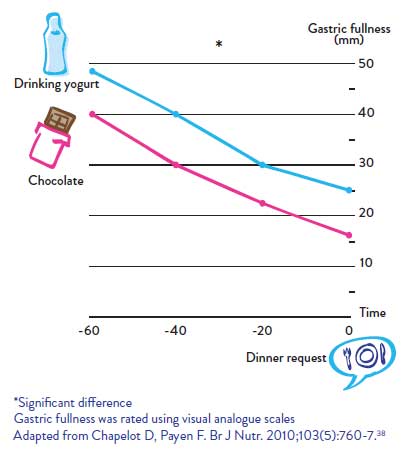
Yogurt achieves greater satiety than high energy-dense snack foods such as chocolate
Among healthy young men, a yogurt drink taken as a mid-afternoon snack induced a greater feeling of fullness in the hour before a meal than a chocolate bar of the same calorie content.
High-protein yogurt could be a healthy replacement for high energy-dense snacks
Consuming yogurt as a high-protein, less energydense
snacks instead of high-fat snack foods can improve appetite control and satiety, and reduce energy intake.
References:

“Yogurt can enhance satiety and help to manage energy intake” is one of the 10 evidence-based conclusions made by the YINI board about the health effects of yogurt. Learn more below…
A similar pattern of results was drawn from a study comparing low-fat yogurts with fruit drinks containing the same amounts of calories. Yogurt containing peach – whether in a pot eaten with a spoon or in drinkable form – was more satiating than a peach-flavoured dairy drink and a peach juice drink.
Both the yogurts were associated with less hunger and higher fullness ratings.
“The low energy density of yogurt means that, as a snack or part of a meal, it can be consumed in satisfying portions that help to manage hunger and reduce energy intake.” – Professor Barbara Rolls
For more information and details, learn how yogurt can be a satisfying snack through our digest.

“Yogurt can enhance satiety and help to manage energy intake” is one of the 10 evidence-based conclusions made by the YINI board about the health effects of yogurt. Learn more below…
Consuming yogurt can increase the feeling of being full and this effect on the appetite may help reduce calorie intake.
In a study of dairy snacks, the greatest appetite suppression was seen with yogurt:
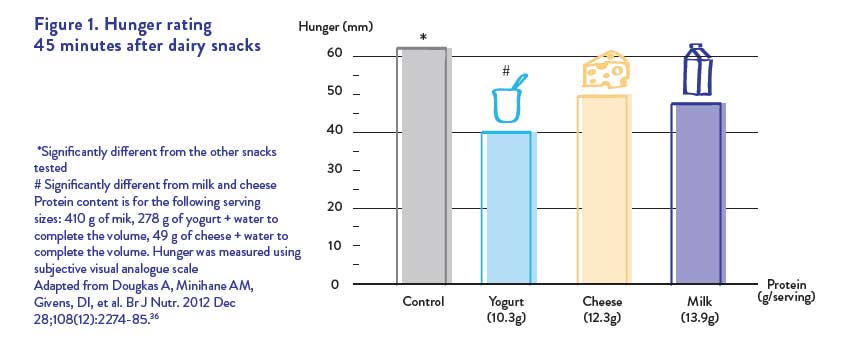
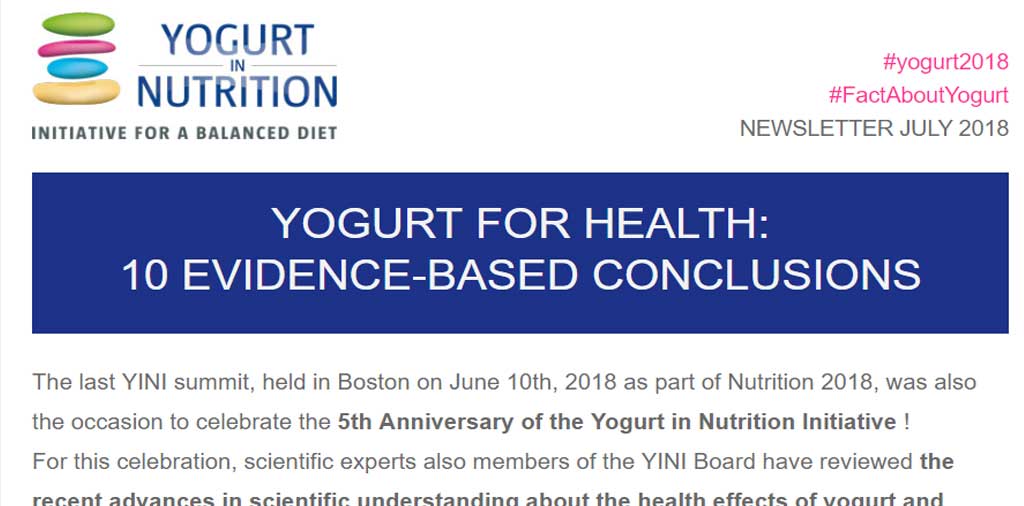
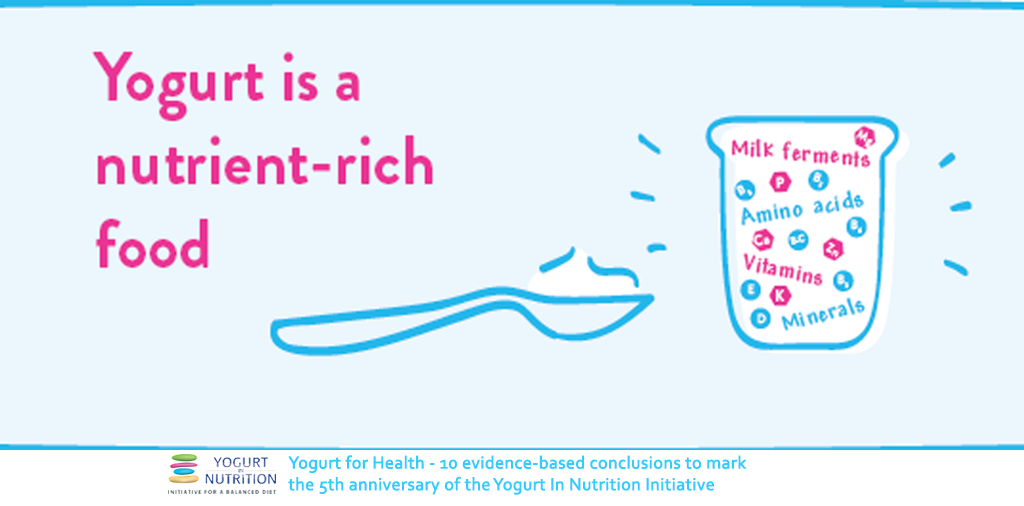
“Yogurt is a nutrient-rich food” is one is one of the 10 evidence-based conclusions made by the YINI board about the health effects of yogurt… learn more below
Yogurt’s contribution to sugar intake is relatively low
The World Health Organization recommends limiting the consumption of non-milk extrinsic sugars – which include those added to food by manufacturers or by consumers – to a maximum of 10% energy intake. However, many people in Western societies, especially children, are exceeding this threshold.
Concerns that sweetened yogurt is contributing to these excess sugar intakes are not supported by the scientific data.
While more than 50% of total sugars and 66% of added sugars in children’s diets come from sweet products such as cakes, sweets and sugary drinks, yogurt accounts for only 1–8% of total sugars and 4–9% of added sugar to children’s diets in Europe.
In the USA, a NHANES analysis found that flavoured yogurt contributes about 1% of added sugars to the diets of adults. This compared with 28.1% from soft drinks. As sugar may make a food more palatable for children, there is an argument that sweetness (consumed within recommended calorie amounts) may promote consumption of a nutrient-rich food. The American Academy of Pediatrics comments that, while added sugars do not provide nutritional benefits, sugars themselves are not necessarily harmful. It says, ‘Used along with nutrient-rich foods and beverages, sugar can be a powerful tool to increase the quality of a child’s diet.’

Fermented food such as yogurt and cheese are popularly considered good for our health. All sorts of benefits have been suggested, from weight control to protection against killer diseases such as cancer, diabetes, heart disease and stroke. But how much of this is just wishful thinking, and how much is supported by real science?
A team of Swiss scientists has examined the evidence – and found that yogurt stands out among fermented foods as having the strongest evidence for a beneficial effect on risk factors for type 2 diabetes.
Fermented foods are made with the help of microbes and enzymes. They’ve been used since early human civilisations as a way of preserving food or improving the taste or nutritional qualities of a food. Fermented foods are present in all food groups including dairy, vegetables, cereals, fruits, meat and fish. Among these, the effect on health of dairy products such as yogurt has been a particular focus of research attention.
In an extensive review of studies looking at the effects of a range of fermented foods on diseases – heart disease, stroke, high blood pressure, diabetes, high cholesterol, cancer and inflammation – the authors found that the strongest evidence for a health benefit was for yogurt, on the risks associated with type 2 diabetes.
They also found some weaker evidence that cheese is associated with a reduced risk of stroke and that yogurt might help reduce weight gain. In most cases, they found no effect, either positive or negative, although there was some inconsistent evidence that total consumption of fermented dairy products could protect against cardiovascular disease.
The researchers also point out that fermented products such as yogurt and cheese can allow people with lactose intolerance to consume dairy products without suffering symptoms.
For all the other fermented food and drinks studied, such as pickles, wine, beer and coffee, there were many promising signs from laboratory trials. But none had been backed up by research in humans.
The researchers found no evidence to suggest that normal consumption of fermented foods might be harmful to health.
‘The strongest evidence for a beneficial effect of fermented dairy products was found for the effects of yogurt on risk factors associated with type 2 diabetes.’ Gille D et al, 2018
The evidence for yogurt’s positive effect against type 2 diabetes comes from five separate reviews looking at the health benefits of fermented dairy products.
The researchers suggest several ways in which yogurt consumption might achieve this protective effect against risks for type 2 diabetes. They point out that the probiotic bacteria present in yogurt have been shown to improve lipid profiles and the antioxidant status of people with diabetes. These probiotics can also improve cholesterol levels and may help boost insulin sensitivity, which becomes reduced in the run-up to type 2 diabetes. Fermentation by-products, such as peptides and vitamins, in particular vitamin K2, synthesised by live bacteria might also contribute to this beneficial effect.
According to the researchers, only five EU states recommend either probiotics or fermented milks in their national nutritional guidelines. They suggest that further research into specific products such as yogurt could improve this guidance.
In order to strengthen the evidence for or against the health benefits of fermented foods, the authors also call for further well-designed studies to see the effect of fermented products in specific health conditions. This would allow clear recommendations to be made, for example, on the consumption of yogurt and diabetes, or cheese intake and stroke.
Find out more: read the original article.

